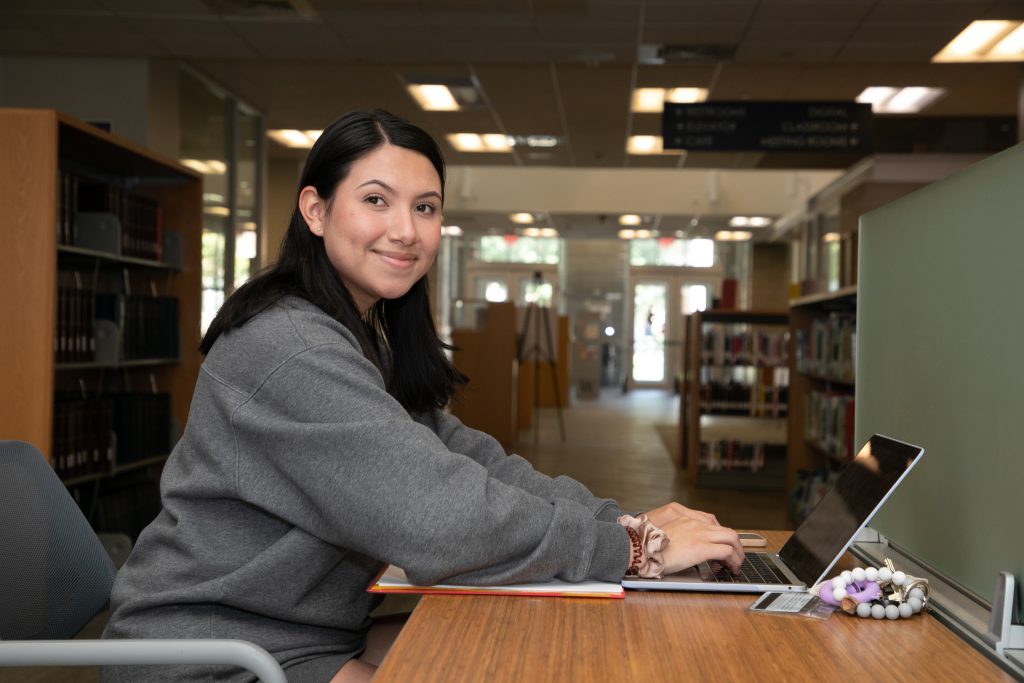Internship inspires Garcia to assist Spanish-speaking communities

At first, the words came easily for Karina Garcia.
It wasn’t until Garcia and her family immigrated from Michoacan, Mexico, to the United States that she grasped the limitations of language. Suddenly, words that came easily to Garcia in Spanish proved elusive in English.
Learning a new language motivated Garcia to take part in the Spanish Service-Learning Internship Program at Mississippi University for Women so she could give back to others in similar situations.
“Since I once struggled with learning English and integrating into society as a resident in the United States, I felt very fulfilled to give back the help I once received,” said Garcia, who lived in Mexico until she was 9 years old and moved to the US in the summer of 2011.
“The internship was one of the most rewarding services I have committed to. Being able to help someone improve their English and watch them grow was extremely rewarding and fulfilling.”
Garcia minored in Spanish for the first two years she attended The W while she took her nursing prerequisites. The Spanish Service-Learning Internship Program was the final step she took to complete her minor before she started in nursing school at The W. While in the internship program, Garcia helped a woman from Argentina improve her English and prepared her to take the Test of English as a Foreign Language (TOEFL) Assessment. She also translated documents — Power of Attorney, Advanced Healthcare Directives and Name and Gender Legal Terms documents and flyers for the LGBTQ Justice Project of ACLU of Mississippi — for the Spanish-speaking community.
In addition to assisting others, Garcia said the internship helped her learn medical terminology in Spanish regarding human body systems, illnesses and women’s health-related needs, among others. She said that knowledge will prove invaluable because she plans to pursue a certification as a Spanish medical interpreter and a Master of Science degree in Nursing after she completes her bachelor’s degree.
“Translating documents and making them more accessible to the Spanish-speaking community was also very rewarding,” Garcia said. “My goal was not to translate documents word for word. Instead, I focused on translating the material in a more simplistic way for the community to understand and keeping the meaning of the documents.
“My family, especially my parents, also still require aid to overcome the language barriers as non-native English speakers, so I am grateful I had the opportunity to expand my help not only to my family but now to the Spanish-speaking community.”
Dr. Reyna Vergara, an assistant professor of Spanish at The W, said the first priority in the Spanish program is to send students abroad because it provides them with full immersion in the language and culture. Given COVID and other hardships or responsibilities some students are encountering, Vergara said the class was a needed alternative to the study-abroad experience for the Spanish major and the Spanish Education K-12 Certification requirement. As a result, in the spring of 2020, Vergara started teaching the internship as a special topic to explore the possibility of developing it into a new course. The course features 120 hours divided between theory and practice, and its enrollment has grown each year since inception.
“I have seen the internship evolve in very positive ways,” Vergara said. “This past spring, all three interns had another major. Two of them were double-majors and one was a minor who got accepted in the school of nursing that semester. It gave me great pleasure to see the interest that these interns had not only in serving the communities of Spanish-speaking descent presently, wherever there was a need, but also in their future careers. They wanted to learn terminology and be able to communicate in Spanish in their respective fields.”

Garcia hopes her contributions show the Spanish-speaking community that there are many resources available to them despite language barriers. She also she was a helpful resource to the woman from Argentina and that she assisted in her integration into English-speaking society. Garcia plans to take that experience and implement it in the next steps in her career.
“I encourage other students to participate in the Spanish Service-Learning Internship. It is a great way to explore one’s capabilities and passions when serving the community,” Garcia said. “At the same time, it does not become an extra responsibility; rather, it becomes something so fulfilling that it eventually encourages supplementation to one’s career. It is a great way to explore one’s interests and aid with decisions regarding future career paths. I explored my interests and gained motivation to academically and personally engage with work that will benefit our community.”
Students with questions about the Spanish Service-Learning Internship or the Spanish program can contact Dr. Vergara at revergara@muw.edu.